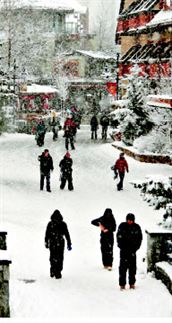From the Buyers Guide 2010 issue
With 2010 now just around the corner, the Canadian Alpine Ski Team is taking every opportunity to gain intimate knowledge of every bump and curve of the Olympic courses. Call it the home-turf advantage.
Whether on the snow or in the village, Rob Boyd, Canadian women’s team head coach, said every moment spent in Whistler is extremely important. “We hope Whistler will become a second home for the athletes. It’s silly not to take advantage of what has been made available to us.”
National team members have been running, jumping and sweating buckets to prepare for what is incontestably the most important season of their collective careers. Boyd hopes the effort will lead to Olympic medals when the team returns from the World Cup circuit for the 2010 Winter Games in February.
“It wasn’t business as usual in the off-season. If we want to win some Olympic hardware this winter, we had to get tougher and make some even bigger sacrifices,” Boyd said. And athletes such as Britt Janyk agreed. “A training camp like the one in Whistler was a great opportunity for the team to come together in the Olympic environment and become more familiar with the surroundings. We just soaked up the environment of Whistler a little,” said Janyk.
Whistler is also known for challenging weather situations. Boyd explained how critical it is for athletes to adapt to all conditions. Boyd will often start the day with a surprise race. Regardless of feelings, equipment or attitude, the skiers are told to be the fastest. “We put so much preparation into one important race,” said Boyd. “We train our athletes to race on demand. They have to be ready regardless of how they are feeling. It’s impressive to see them rise to the challenge.”
BUSINESSES BRACE FOR THE BOOM
The 2010 Winter Games is expected to create a boom for businesses in the Olympic town of Whistler, but not everyone will immediately reap the rewards.
While some businesses in town will be extending hours, stocking up and expecting sales to skyrocket, others are predicting demand to dwindle and some plan to simply close up shop. Extremely Canadian, which offers advanced ski camps and coaching, is planning to scale back. Co-owner Jill Dunnigan said their two-day steep skiing clinics might not even be running during the Games. Visitors to Whistler before or after the Games will likely find deals and discounts in town they never expected in such an important year.
Whistler Mayor Ken Melamed has had to remind the town that not all benefits will be realized this season. “Olympic participants and spectators have their own needs, such as eating and sleeping, and may not have a lot of time for shopping or recreation,” said Melamed. “In any Olympics there are some businesses that do better than others and some that don’t.”
Melamed told local businesses to adapt to the event and find ways to turn it into an opportunity. Local restaurants, for instance, are bracing for the opportunity. The plan is to allow some to stay open 24 hours in the months around the Games. The sign-up list for steeps clinics may not be bulging until the following season.
WORKING WHISTLER
In a Whistler basement suite, 26-year-old Sandra Lawson is reading the want ads and seriously considering changing her plans for the winter. University-educated and eager to work, Lawson can’t find a job.
Every year, like any big ski town, Whistler experiences a migration of a young snow-loving workforce, eager to work hard in exchange for a winter on the slopes. But a new reality has taken shape in Whistler. After years of employee shortages, there’s now an accepted feeling of no work available. Career ads in the local papers have shriveled to a few dozen each week and online job boards are bare.
The job shortage is new to Whistler. Not long ago, businesses were hiring employees at every opportunity and praying that at least a few would stay until the end of the ski season. Front-line staff often joked: “Don’t show up to work if you don’t want to. You can always find a job somewhere else.”
With 2010 around the corner, many expected the job market to boom. Jobs during the Winter Games are plentiful, but a few weeks of work doesn’t pay the bills the rest of the season, complain many.
“I have a degree and I’ve never had to work in a fast-food restaurant. But now I am starting to think that serving milkshakes would be really sweet,” Lawson sighs. “I can only hope tourists come back to Whistler and the job market picks up. Otherwise I have to leave.”
